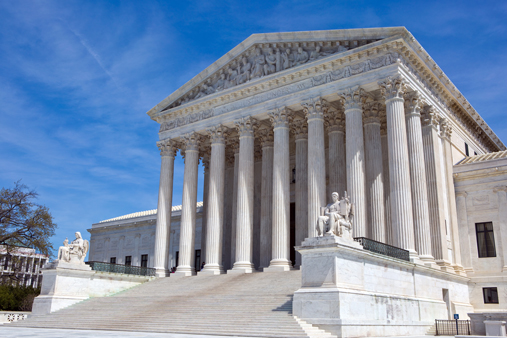The U.S. Supreme Court issued its opinion yesterday in Alice Corporation Pty. Ltd. v. CLS Bank International et al. (No. 13-298) that patent claims drawn to an otherwise patent-ineligible abstract idea of mitigating settlement risk are not patentable merely because they require “generic computer implementation.”
Section 101 of the Patent Act defines the subject matter eligible for patent protection. It provides: “Whoever invents or discovers any new and useful process, machine, manufacture, or composition of matter, or any new and useful improvement thereof, may obtain a patent therefor, subject to the conditions and requirements of this title.” Courts have long held that Section 101, however, contains an implicit exception for laws of nature, natural phenomena, and abstract ideas.
The unanimous decision delivered by Justice Clarence Thomas affirmed the Federal Circuit’s prior determination that the claims to an intermediated settlement—i.e., the use of a third party to mitigate settlement risk—are not patent-eligible. Applying the framework set forth in its 2012 opinion in Mayo Collaborative Services v. Prometheus Laboratories, Inc., the Court first quickly determined that the concept of intermediated settlement is an abstract idea, comparing it to the concept of risk hedging found patent-ineligible in the Court’s 2010 decision in Bilski v. Kappos. The Court then analyzed whether the requirement of a generic computer implementation in the claims transforms the otherwise abstract idea of intermediated settlement into a patent-eligible invention. It did not. The Court found that the mere introduction of a computer to an abstract idea—whether the abstract idea was applied by a computer or its use was limited to a particular technological environment—was not sufficient to supply the required “inventive concept” needed to transform the abstract idea into a patent-eligible invention.
The Court’s opinion does allow that even if it is determined that a claim is directed to an abstract idea, the claim may still be patent-eligible if it meets the “new and useful”/ “inventive”/ “transformative” test:
At the same time, we tread carefully in construing this exclusionary principle lest it swallow all of patent law. At some level, “all inventions…embody, use, reflect, rest upon, or apply laws of nature, natural phenomena, or abstract ideas.” Thus, an invention is not rendered ineligible for patent simply because it involves an abstract concept. “[A]pplication[s]” of such concepts “‘to a new and useful end,’” we have said, remain eligible for patent protection. (Slip Op., p. 6) (internal citations omitted).
However, in this case, the Court found that the claimed functions performed by a computer—creating and maintaining “shadow” accounts, obtaining data, adjusting balances, and issuing automated instructions—are purely conventional. Instead, the claims simply instructed the practitioner to implement the abstract idea of intermediated settlement on a generic computer. Citing its own precedent, the Court concluded that “the mere recitation of a generic computer cannot transform a patent-ineligible abstract idea into a patent-eligible invention.”
For more information, contact the Barnes & Thornburg attorney with whom you work or a member of the firm’s Intellectual Property Law Department in the following offices: Atlanta (404-846-1693), Chicago (312-357-1313), Columbus (614-628-0096), Delaware (302-300-3434) Elkhart (574-293-0681), Fort Wayne (260-423-9440), Grand Rapids (616-742-3930), Indianapolis (317-236-1313), Los Angeles (310-284-3880), Minneapolis (612-333-2111), South Bend (574-233-1171), Washington, D.C. (202-289-1313).
© 2014 Barnes & Thornburg LLP. All Rights Reserved. This page, and all information on it, is proprietary and the property of Barnes & Thornburg LLP. It may not be reproduced, in any form, without the express written consent of Barnes & Thornburg LLP.
This Barnes & Thornburg LLP publication should not be construed as legal advice or legal opinion on any specific facts or circumstances. The contents are intended for general informational purposes only, and you are urged to consult your own lawyer on any specific legal questions you may have concerning your situation.








/Passle/6488d4630e7e25c9ac9f834a/MediaLibrary/Images/2024-07-18-19-15-33-047-669969d52008239f764a11af.png)


/Passle/6488d4630e7e25c9ac9f834a/SearchServiceImages/2024-07-17-15-17-44-967-6697e0980752df56d2441ada.jpg)
